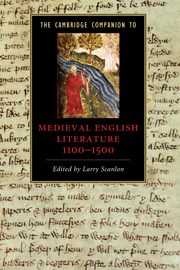12 - Geoffrey Chaucer
from Part II - Authors
Published online by Cambridge University Press: 28 November 2009
Summary
In the House of Fame Chaucer's visionary alter-ego encounters a maze of literary monuments. Kidnapped by an abusive eagle - a comic emblem of Dante - and deposited unceremoniously before a cliff of ice, he makes his way up to a palace of beryl consisting almost entirely of windows and “pynacles.” There he discovers Lady Fame herself, high above milling crowds, on a dais supported by pillars, each displaying a great poet or historian, Josephus the Hebrew, Statius, Homer, Guido della Colonna, Geoffrey of Monmouth, Virgil, Ovid, Lucan, Claudian, and many others. As he exclaims, the hall was as full of authors of “olde gestes” as trees are full of rooks' nests. With Chaucer's characteristically sly, self-deprecating irony, this whimsical ekphrasis aptly figures the vicissitudes of poetic authority. The pillars Chaucer's narrator envisions are mainly made of iron, serviceable and dependable; nevertheless they stand in a radically uncertain structure, founded on the illusory solidity of a cliff of ice. Whatever the strength of its own intrinsic value, the sources and effects of poetic authority must remain framed by uncertainty. The poetry of the present or of the recent past, here embodied in the figure of Dante, leads the reader to the durable wealth of the more ancient past. Yet taken in its entirety previous tradition overwhelms, precisely because it endures so long and because what endures is so rich and profuse. The profusion overwhelms even the minimal level of human organization by the House of Fame and can be made intelligible only by recourse to the natural world. The forest of rook's nests is a figure of renewal, but one that is slightly macabre. These are the nests of scavengers, incubators of new life out of a past in decay and putrefaction.
- Type
- Chapter
- Information
- The Cambridge Companion to Medieval English Literature 1100–1500 , pp. 165 - 178Publisher: Cambridge University PressPrint publication year: 2009



